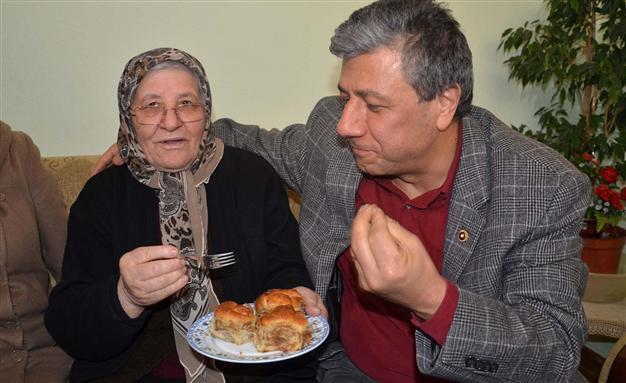Violation of MP’s rights may amount to violation of electorate’s rights: Turkey's top court
ANKARA

The Constitutional Court ruled Dec 4 that the long imprisonment of main opposition Republican People’s Party (CHP) deputy Mustafa Balbay amounts to a “violation of rights.” He met with his parents Dec 13 in Aydın. DHA photo
Violation of the rights of an elected person has the potential to turn into violation of the rights of the same person’s electors, a top court has said, justifying its recent ruling for the release of journalist and main opposition Republican People’s Party (CHP) deputy Mustafa Balbay, pending trial.
The lawful cause of the Constitutional Court’s ruling which paved the way for Balbay’s release was published in the Official Gazette on Dec. 13. The Court remarkably referred to both Article 19 and Article 67 of the Constitution in particular.
Thus, the ruling is based on both constitutional protection of personal liberty as well as protection of the right to be elected and engage in political activity. That’s to say it is not only related to unfairness of lengthy detention and has two essential dimensions intermingled with each other.
“The right to be elected doesn’t only include the right to be a candidate in elections, but at the same time includes the right to be present at the Parliament as lawmaker after being elected. Without a doubt, this requires the person to be able to actively use their authority to represent with their title of lawmaker after being elected. In this context, the intervention into the participation of the elected lawmaker’s in legislation activity may constitute an intervention into his voters’ right to declare their free will, not only into his right to be elected,” the Court said, as it also referred to case law by the European Court of Human Rights (ECHR) which underlined the importance of freedom of expression, particularly for elected representatives of the people.
“The ECHR, starting from the relation between lawmaker and electorate, has emphasized that freedom of expression is particularly important for elected representatives of the people, because the lawmaker represents the electorate, defends their [electorate’s] interests by drawing attention to their demands, thus an intervention into the freedom of expression of a dissident lawmaker requires a tighter supervision,” the Court said.
There are six other lawmakers jailed in Turkey -- five from the Peace and Democracy Party (BDP), which shares the same grassroots with the outlawed Kurdistan Workers’ Party (PKK) -- and one a former soldier from the Nationalist Movement Party (MHP), who was jailed over an unrelated coup plot.
Balbay’s release could set a precedent for the jailed BDP deputies, lawyers said. But the MHP deputy has already lost an appeal to the higher court, leaving him with no chance of release under the ruling that freed Balbay.
Balbay, sentenced to almost 35 years in prison, was freed pending appeal by an Istanbul court after the Constitutional Court ruled on Dec. 4 that his pre-trial detention period of more than four years had violated his rights.
As of Dec. 10, following his release from nearly five years in prison on security charges late on Dec. 9, Balbay took his oath of office as a member of Parliament, raising hope among other jailed deputies that they could follow in his footsteps.
He was among 275 defendants including an ex-military chief, retired officers, academics, journalists and politicians jailed in August over an alleged plot to overthrow Prime Minister Recep Tayyip Erdoğan’s government.
The ruling enabled him to take his oath a full 30 months after being elected for the CHP. Balbay denied any wrongdoing in the so-called “Ergenekon” conspiracy against the state.
